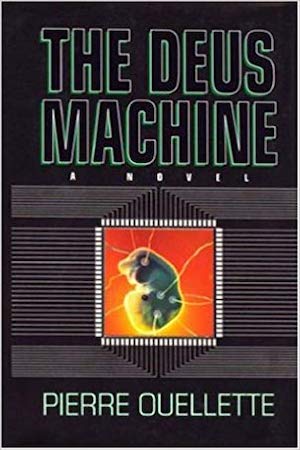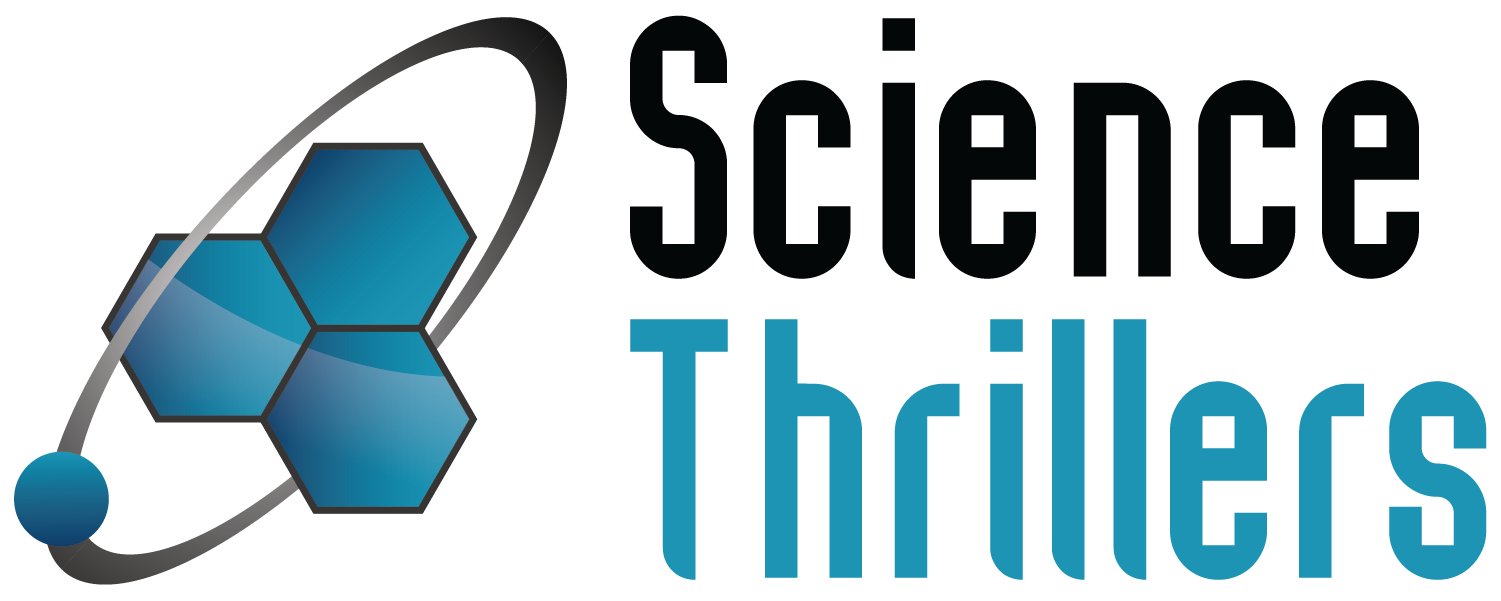
Summary:
An economic downturn has sent the United States into the throes of depression. Middle-class riots and a crack-like designer drug, Zap 37, rip into the social fabric. A paramilitary government cabal is determined to maintain America’s superpower status at any price. Their weapon: the DEUS machine, the computer brainchild of a mad genius. DEUS is empowered to create and relentlessly improve a “child” of its own, rendering it immensely powerful and incomprehensible to its creators.
The power of DEUS is put to work on understanding the meaning of DNA sequences, but for an utterly malignant purpose. As a consequence of the research, a bioapocalypse looms: horrific new life forms emerge and threaten the very existence of humankind. Michael Riley, an unemployed computer expert with a dark episode in his past, along with the woman he loves and a fatherless little boy, are the only people who can stop the madness.Primary setting: Portland, Oregon area
Publication Date: 1993
Category: science fiction
ScienceThrillers technical content rating: ![]()
ScienceThrillers.com book review of The Deus Machine :
The Deus Machine by Pierre Ouellette was first published in 1993, set in the then-future year of 2005. It reads frighteningly like a story that could unfold today. Plot summary is difficult because Ouellette has woven a complex tale with threads connecting White House conspiracies, venture capital, economic distress, the international drug trade, high-tech computing, molecular biology, juvenile delinquency, martial law, philosophy, PTSD, and more. But no matter, because in my book reviews, I don’t reveal plot, I want to help you decide whether this book is one you should invest your time and money in reading.
On that standard, here is some of what you should know about The Deus Machine. It is extraordinarily well-written, with stronger literary qualities than the majority of mainstream thrillers. The characters are more developed–and there are more of them–than in most mainstream thrillers. (This still isn’t high literature, though; “bad guys” and “good guys” are unambiguous categories in this novel, and each protagonist is heavily defined by a single incident in his/her past.) The book’s science covers computing technology, artificial intelligence, genomics, and molecular biology with a high level of accuracy and a fair amount of depth. (I give only four out of five “biohazard” symbols in my tech rating because a key plot element involving introns is far-fetched, to say the least.)
Most of Ouellette’s political, technical, and social premises are reasonably believable, and therefore scary. The author creates what one reviewer (Tom De Haven of Entertainment Weekly) describes as “the best, and hungriest, predators since Jurassic Park.” No argument from me on that: just WAIT ’til you read the over-the-top imaginative descriptions of drillers, needle hounds, and medugators.
On the other hand, some science thriller fans may be put off by certain features of this novel. As I said, it is more literary than most thrillers. Instead of going down like popcorn, it’s more of a rich meal. To set up the characters and the various plot elements requires a lot of pages at the beginning. These pages are good reading, but they do not fit the contemporary thriller standard which typically plunges the reader headfirst into the action on page one, with the main threat already in motion. With The Deus Machine, you must be patient, and trust that the author is not wasting your time. He’s not. The story pacing accelerates gradually, and eventually one heart-stopping situation after another keeps the book in your hands until the end. (The ending itself is not to everyone’s taste, including my own, but I forgive the author this in light of the excellent storytelling that precedes it.)
Don’t think too hard about the origin of the monsters. It doesn’t make a whole lot of sense to me either. Just go with it.
Another oddity of the book: it’s written entirely in the present tense, except when the author is relating flashbacks of past events. This is unconventional and felt a little weird to me at first, but I got used to it. I think one can argue that this atypical usage heightens the suspense. But it may also contribute to the overall tone of The Deus Machine which feels somewhat like a news report– emotionally flat dictation of emotionally-charged events. Some Michael Crichton books have this feel; whether it works for you is a matter of taste.
The Deus Machine is classified by some as science fiction / SF. It certainly has strong SF qualities, but I believe it remains in the science thriller camp, with a realistic near-future setting, relentless pacing against a ticking clock with high stakes, and fictionalized science that stays within the range of many science thrillers (i.e., no interstellar travel, etc.).
If you are a crossover reader who enjoys both SF and science thrillers, this book is an excellent choice.
Aside: I love how in this book, reporters, whistleblowers, and freedom of information are portrayed as fundamental bulwarks against the abuse of power.
Parent alert: R-rated profanity, violence (some of it sexual), and adult themes
An excerpt from my 2011 interview with author Pierre Ouellette:
ScienceThrillers.com: Your thriller The Deus Machine was published in 1993 but takes place in the future year of 2005. When I read the book in 2011, I was impressed by how timely it seemed. Are you pleased with your soothsaying? What things did you “predict” in the book that have now come true?
Pierre Ouellette: I’ve always been something of a futurist and I don’t think there’s anything particularly mystical about it. I like the idea of constructing futures that originate from present realities. In most cases, it’s simply a matter extrapolating existing information or trends. In The Deus Machine, there were three basic suppositions about the future that proved to be true over time. One was the existence of a single chip that contained four microprocessors. So-called “quad processors” have now become commonplace in consumer systems. The second supposition was the idea of very powerful software dedicated to processing genetic databases at the base pair level, looking for all kinds of relationships. There is now the entire field of “bioinformatics” which includes these types of applications. Finally, I pegged the collapse of the housing bubble (and the resulting “Mortgage March”) as occurring in 2005, and was just a few years off. A fourth prediction was apparently ahead of its time, but will eventually happen. This is the development of the “biocompiler,” which gives biotech engineers a high-level programming language capable of designing new life forms from scratch.



0 Comments